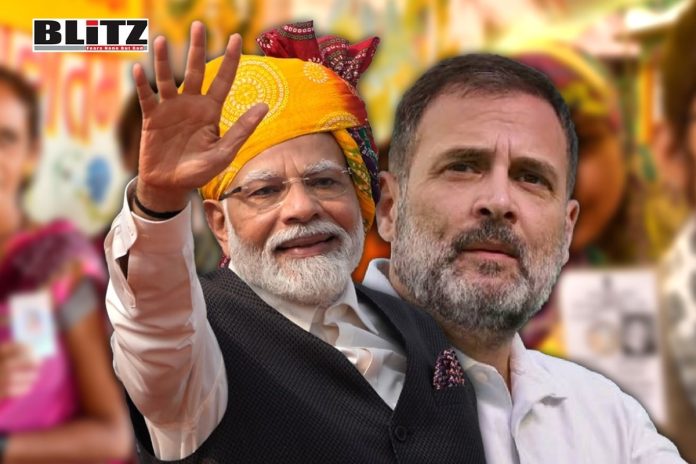India, recognized as the world’s largest democracy, stands at a momentous juncture with the onset of the 2024 general elections. This isn’t merely a routine electoral event but a transformative milestone that will deeply influence India’s political, economic, and geopolitical landscape for the foreseeable future. As approximately one billion voters from diverse regions and backgrounds prepare to participate in this democratic process, the world watches with bated breath. The outcome of this election carries profound implications, capturing global attention as it holds the power to redefine India’s path forward in significant ways.
The 2024 general elections in India are set to unfold across 7 phases, encompassing a span of six weeks from April 19 to June 1. The magnitude of this electoral process is truly immense, reflecting the vastness and diversity of the Indian electorate. As voters journey to the polling stations, they will play a pivotal role not just in shaping the composition of the Lok Sabha, the lower house of India’s parliament, but also in determining whether Prime Minister Narendra Modi and his Bharatiya Janata Party (BJP) will continue at the helm for another term.
Prime Minister Narendra Modi, a figure who elicits strong opinions in Indian politics, is vying for a third consecutive term at the helm, supported by his Hindu-nationalist Bharatiya Janata Party (BJP). Both analysts and pollsters are forecasting a formidable performance by the BJP in the upcoming elections. This anticipated success is largely credited to India’s impressive economic growth trajectory under Modi’s stewardship. Currently standing as the world’s fifth-largest economy with a GDP of $3.7 trillion, India has witnessed a remarkable economic surge. With ambitious goals, the country aims to ascend to the rank of the world’s third-largest economy by 2027.
The economic policies implemented by the Modi government have not only fueled India’s GDP expansion but also ignited a surge in its stock market. Recently surpassing Hong Kong’s, India’s stock market now ranks as the fourth-largest globally, boasting a valuation exceeding $4 trillion. However, alongside these accomplishments, lingering concerns persist regarding the sustainability of India’s economic growth. Issues such as subdued private and foreign investments, as well as declining exports, serve as cautionary indicators of potential challenges looming on the horizon.
From a geopolitical perspective, the reelection of Prime Minister Narendra Modi carries substantial implications, particularly concerning India’s relations with Western nations and its strategic stance towards China. India has bolstered its ties with the United States, positioning itself as a pivotal partner in the Indo-Pacific region. This partnership serves as a counterweight to China’s expanding influence in the area. Furthermore, the Biden administration’s initiatives to diversify supply chains away from China could amplify India’s attractiveness as a prime destination for foreign investment and technology manufacturing.
As the electoral battle intensifies, two major contenders vie for power—the BJP-led National Democratic Alliance (NDA) and the opposition coalition, Indian National Developmental Inclusive Alliance (INDIA). Led by the Indian National Congress and spearheaded by Rahul Gandhi, the opposition aims to challenge the BJP’s dominance by focusing on pressing issues such as unemployment, rising costs, and concerns about development and corruption.
Despite concerted efforts by the opposition to rally support, the BJP-led National Democratic Alliance (NDA) is anticipated to clinch another significant triumph, ensuring the continuation of political stability prevalent over the past decade. Analysts foresee a seamless continuation of India’s foreign and economic policies, underscoring a steadfast dedication to prolonged growth and fortified strategic alliances.
The concerns of the electorate reflect a complex socio-economic landscape, with unemployment ranking as the top concern for 27% of voters, followed by rising costs, declining quality of life, and concerns about development and corruption. These issues underscore the challenges facing India as it strives to balance rapid economic growth with the need for inclusive development and effective governance.
Logistically, conducting an election on the scale of India’s presents unparalleled challenges. The Election Commission of India has embarked on detailed planning to guarantee that every registered voter can easily access polling stations. With an impressive infrastructure that includes over 1.05 million polling stations, 5.5 million electronic voting machines, and a deployment of 15 million staff and security personnel nationwide, the sheer magnitude of organizing India’s elections is a testament to its logistical prowess and commitment to democratic integrity.
In terms of electoral expenditures, the 2024 general elections in India are anticipated to set new records, eclipsing previous benchmarks. Projections suggest that the six-week electoral process will exceed the spending of the 2020 U.S. presidential election, which totaled $14.4 billion. Compared to India’s expenditure of $8.6 billion during the 2019 general elections, the financial commitment to this electoral endeavor is significant. These substantial financial outlays underscore India’s dedication to preserving democratic principles and ensuring a transparent, free, and fair electoral process.
As the global community eagerly anticipates the results of India’s 2024 general elections, the gravity of this democratic exercise is truly monumental. Set to unveil the results on June 4, all eyes are on India as it underscores its unwavering commitment to democratic values, collective civic participation, and the transformative power of the electorate in shaping the nation’s destiny. Whether the BJP under Prime Minister Modi clinches another term or encounters a robust challenge from the opposition, the 2024 elections are undeniably poised to be a watershed moment in India’s democratic odyssey. This pivotal election will not only resonate deeply within India’s diverse populace but also hold profound implications for the global stage, impacting international relations, economic dynamics, and the future trajectory of democratic governance worldwide.




